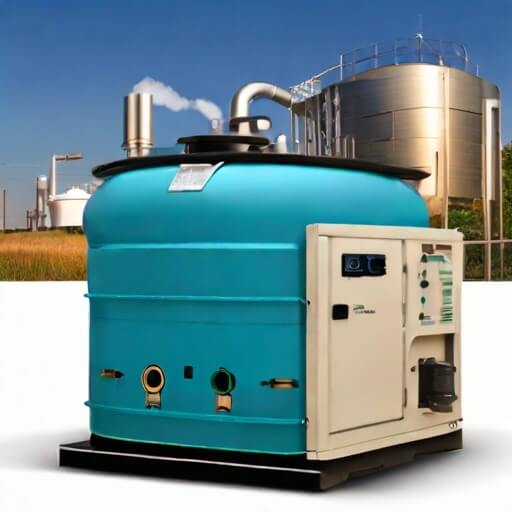The Best Portable Inverter Generators for Off-Grid Living
Table of Contents
- Understanding Portable Inverter Generators
- Factors to Consider When Choosing a Portable Inverter Generator
- Top Portable Inverter Generator Options
- Additional Considerations for Off-Grid Power
- Conclusion
The call of self-reliance and a simpler life is drawing more and more people towards off-grid living. Whether it’s a cabin nestled in the woods or a mobile van ready to explore, one thing remains constant: the need for reliable power. But traditional generators can be bulky, noisy, and inefficient. That’s where portable inverter generators shine!
This blog post delves into the world of portable inverter generators, exploring the best options for powering your off-grid dreams. We’ll discuss the key features to consider, popular choices on the market, and additional factors to ensure you have the perfect power solution for your off-grid adventure. So, buckle up and get ready to explore the quiet, efficient world of portable inverter generators for off-grid living!
Understanding Portable Inverter Generators
Portable inverter generators are a refined breed of generators designed for convenience and efficiency in off-grid living situations. Unlike traditional generators, which produce “dirty” power with fluctuations, inverter generators utilize advanced technology to offer several key advantages:
- Clean and Quiet Operation: Traditional generators produce a rough form of alternating current (AC) that can be harmful to sensitive electronics. Inverter generators, however, convert the raw engine power into a smooth, stable AC current similar to household electricity. This “clean” power ensures safe and reliable operation for your devices. Additionally, inverter technology significantly reduces noise levels compared to traditional models. This makes them ideal for off-grid communities with noise restrictions or those seeking a peaceful environment.
- Fuel Efficiency: Portable inverter generators often boast impressive fuel efficiency. They typically focus on providing clean, stable power for essential appliances rather than raw power output. This translates to longer operating times on a single tank of gas, minimizing the need for constant refueling and reducing overall fuel consumption.
- Portability and Versatility: Unlike bulky and heavy traditional generators, portable inverter generators are designed with mobility in mind. They are typically lighter and more compact, making them easier to transport and store, especially for mobile off-grid living. This versatility allows you to easily adjust your power source based on your needs, whether it’s powering your cabin or weekend camping trip.
- Powering Sensitive Electronics: The clean and stable power generated by inverter technology makes them perfect for powering sensitive electronics like laptops, smartphones, and other delicate equipment. Traditional generators can cause fluctuations and surges that can damage these devices. With an inverter generator, you can confidently power all your essential appliances without worrying about harming them.
Limitations to Consider
While portable inverter generators offer a compelling package of benefits, it’s important to understand their limitations:
Fuel Usage and Refueling Needs: Despite their efficiency, portable generators still require fuel to operate. Be prepared to factor in fuel costs and the need for regular refueling, especially when considering extended off-grid living.
Lower Power Output: Compared to standby generators, portable inverters generally have a lower maximum wattage output. They are ideal for powering essential appliances and electronics but might not be suitable for running high-powered tools or equipment.
Factors to Consider When Choosing a Portable Inverter Generator
Know Your Power Needs: The Essential Calculation
Choosing the right portable inverter generator hinges on understanding your wattage requirements. In simpler terms, wattage determines how much electrical power your appliances and electronics need to function. To ensure your generator can comfortably handle your off-grid lifestyle, it’s crucial to calculate your total wattage needs.
Here’s why it matters:
- Avoid Overload: Selecting a generator with insufficient wattage can lead to overloading, potentially damaging your generator and appliances.
- Optimize Efficiency: Choosing the right wattage ensures your generator runs efficiently, minimizing fuel consumption and maximizing runtime.
Calculating Your Wattage Needs: A Simple Guide
Don’t worry, calculating your wattage needs doesn’t require an electrical engineering degree! Here’s a simple approach:
- List Your Appliances: Make a comprehensive list of all the appliances and electronics you plan to use off-grid. This could include essentials like refrigerators, lights, laptops, and even power tools.
- Find Appliance Wattage: Most appliances have a label or manual that specifies their wattage rating. This might be listed as “watts” or “amps.” If you can’t find the wattage rating, a quick online search for the appliance model number should provide the information.
- Identify Startup vs. Running Wattage: Some appliances, like refrigerators and power tools, require a higher surge wattage to start up initially. Be sure to consider both the starting wattage (often higher) and the running wattage (the wattage needed for continuous operation) when making your calculations.
- Add It Up!: Once you have the wattage ratings for all your appliances, simply add them together. This total wattage represents the minimum wattage your portable inverter generator should have to power your essential off-grid needs.
Helpful Resources: Appliance Wattage Guides
To simplify the process, there are several online resources that provide comprehensive appliance wattage guides. A quick search for “appliance wattage guide” will yield numerous websites that can help you determine the wattage ratings of your specific appliances.
Remember: This is just a starting point. Consider factoring in future needs or potential upgrades to your off-grid setup when choosing your final wattage requirement.
Fueling Choices for Off-Grid Power
- Gasoline: A familiar option, gasoline is popular for portable inverter generators.
- Pros: Easy to find, often affordable per gallon.
- Cons: Short shelf life, susceptible to price fluctuations, requires ventilated storage.
- Propane: Known for clean burning, propane offers advantages for off-grid living.
- Pros: Long shelf life, readily available in tanks, cleaner burning with fewer emissions.
- Cons: More expensive per gallon than gasoline, refillable tanks might be challenging to find in remote locations.
- Natural Gas: While not portable, natural gas can be cost-effective if available.
- Pros: Often the most cost-efficient fuel, readily available in some regions through a piped hookup, cleaner burning.
- Cons: Requires permanent hookup, limited availability.
Choosing the Right Fuel: Balancing Efficiency and Availability
There’s no single “best” fuel type. The ideal choice depends on your needs and setup. Here are some key factors:
- Storage: Gasoline requires ventilated storage, while propane tanks are easier to store. Natural gas eliminates storage concerns.
- Cost: Gasoline might be cheaper initially, but propane’s shelf life and clean burning can offset the cost. Natural gas is often the most cost-efficient, but availability is limited.
- Availability: Gasoline is widely available, but propane might be more challenging to find in remote locations. Consider refilling options for long-term use.
- Environmental Impact: Propane is cleaner burning than gasoline. Natural gas is also a relatively clean-burning option.
Local Considerations
Research fuel availability in your specific off-grid location. Long-term off-grid living requires reliable fuel sources. Consider the ease of obtaining and storing your chosen fuel type.
Finding Your Quiet Place: Noise Levels and Regulations for Off-Grid Generators
Peace and tranquility are often a major draw for off-grid living. But the roar of a traditional generator can quickly shatter that serenity. This is where portable inverter generators shine! They offer a significant advantage: quiet operation.
Noise Levels: Respecting Your Off-Grid Sanctuary
Beyond personal preference, noise levels can be a crucial factor for off-grid living. Many off-grid communities have regulations or ordinances that limit noise pollution. A noisy generator can disrupt your own peace and quiet, but more importantly, it can disturb your neighbors and potentially lead to fines.
Research Before You Roar
Before selecting your portable inverter generator, research the noise restrictions in your chosen off-grid location. This information is typically available online through the local municipality’s website or by contacting the relevant authorities.
Choosing for Quietude: Selecting a Low-Decibel Generator
Portable inverter generators are known for being quieter than traditional models, but there are still variations in noise output. Look for generators with lower decibel ratings. Most generator specifications will clearly list the decibel level at a specified distance (often measured at 23 feet). Choosing a generator with a lower decibel rating ensures a quieter operation, respecting your off-grid haven and potentially adhering to any noise ordinances in your area.
Finding the Perfect Fit: Portability and Size for Your Off-Grid Generator
One of the major advantages of portable inverter generators is their portability. Unlike bulky and cumbersome traditional generators, these models are designed with mobility in mind. However, portability doesn’t mean one size fits all.
Weight and Size: Choosing Your Off-Grid Companion
Consider your off-grid lifestyle when selecting a generator. For those with a fixed cabin or permanent off-grid setup, weight and size might be less critical. However, for mobile van dwellers or those who plan on frequent transport of their generator, weight and size become key factors.
- Lighter Options for Easy Transport: For ultimate portability, look for generators with a lighter weight and compact design. These generators are ideal for weekend camping trips or situations where frequent movement is necessary.
- Balancing Power with Portability: Generators with higher wattage output will naturally be larger and heavier. If your off-grid needs require more power, consider the trade-off between portability and the ability to run multiple appliances simultaneously.
Choosing the Right Fit
The key is to find a generator that strikes the perfect balance between your power needs and your portability requirements. Carefully evaluate your off-grid lifestyle:
- Will you be transporting the generator frequently?
- Do you have a dedicated storage space, or will the generator need to be moved often?
- What appliances and electronics do you need to power?
Essential Safety Features for Your Off-Grid Generator
We’ve explored the many benefits of portable inverter generators for off-grid living, but it’s crucial to remember: safety first! These generators pack a powerful punch, and ensuring proper safety features are in place is vital.
Prioritizing Safety: Built-in Protections
Look for portable inverter generators equipped with essential safety features to safeguard yourself and your equipment:
- Automatic Shutoff: This feature automatically stops the engine in critical situations like low oil levels or overheating. It prevents potential damage to the generator and minimizes fire risks.
- Overload Protection: Generators can become overloaded if too many appliances are plugged in or if a single appliance draws more power than the generator can handle. Overload protection automatically shuts down the generator in such scenarios, preventing damage to the generator itself and your appliances.
- GFCI Outlets: GFCI outlets offer an extra layer of protection against electrical shock, particularly important when using the generator outdoors or around moisture. They detect imbalances in electrical current and quickly cut off power to prevent serious injury.
Safety Certifications: Ensuring Quality and Peace of Mind
When choosing a portable inverter generator, prioritize models that carry safety certifications from reputable organizations like Underwriters Laboratories (UL) or the Environmental Protection Agency (EPA). These certifications indicate that the generator has undergone rigorous testing and meets established safety standards. By prioritizing safety features and certifications, you gain peace of mind knowing you’re investing in a reliable and secure power source for your off-grid adventures.
Top Portable Inverter Generator Options
Westinghouse WGen2200 Portable Inverter Generator
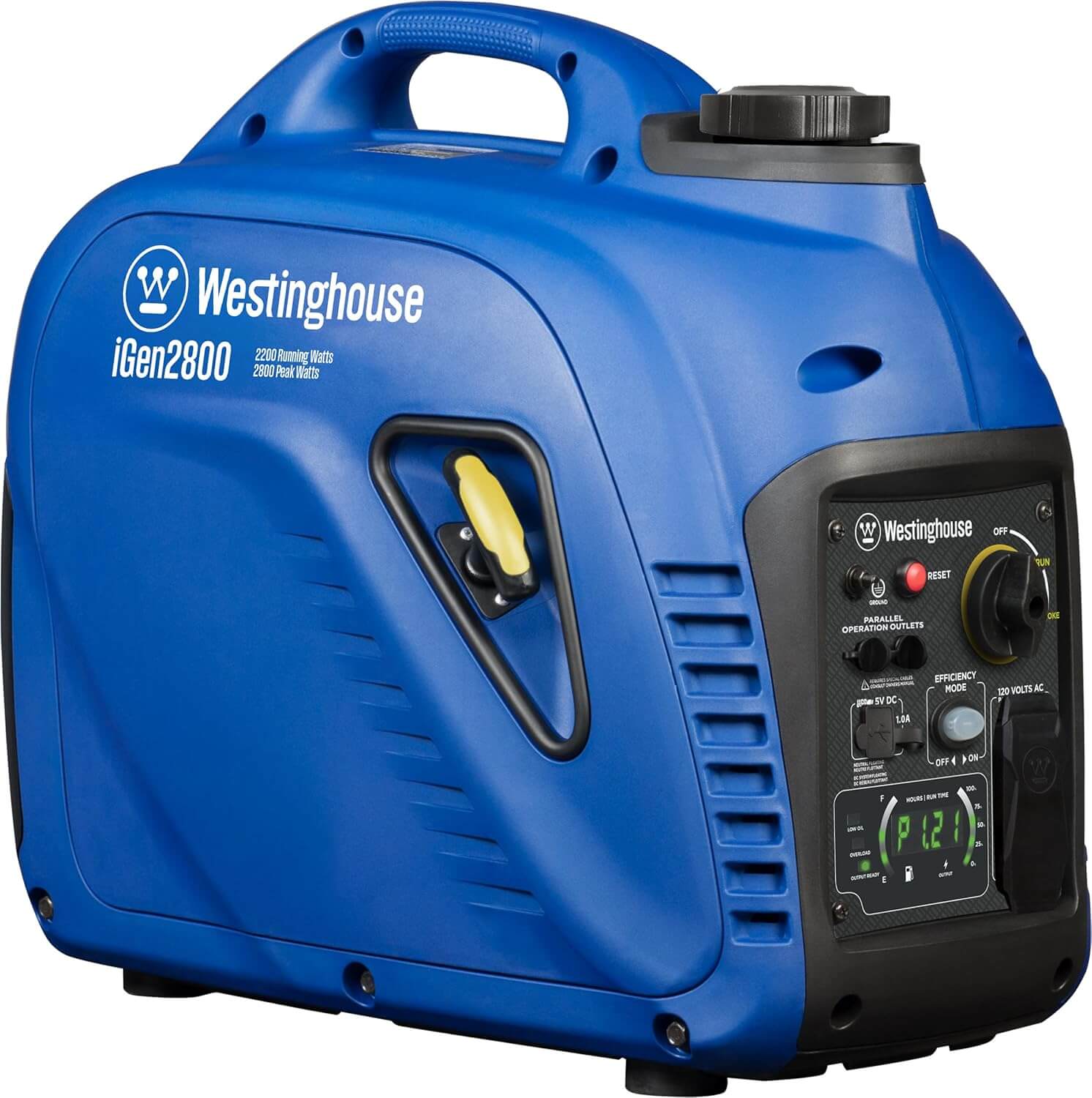
The Westinghouse iGen2500 is a portable inverter generator that offers a compelling blend of power, portability, and affordability for off-grid living or emergency backup. It boasts a clean and quiet operation, making it suitable for use in campgrounds or residential areas with noise restrictions. Here’s a detailed breakdown of the iGen2500’s strengths and weaknesses to help you decide if it’s the right fit for your needs.
Power Performance:
- Wattage: With a rated output of 2200 watts (peak) and 1800 watts (running), the iGen2500 can comfortably power essential appliances like refrigerators, lights, laptops, and even some power tools. However, users with high wattage needs (think air conditioners or heavy-duty appliances) might find this generator a bit limited.
- Fuel Efficiency: The iGen2500 gets high marks for fuel efficiency. At 25% load, the 1-gallon fuel tank can provide up to 10.2 hours of runtime, minimizing refueling needs.
Portability and Noise:
- Weight and Size: At 48 pounds, the iGen2500 is relatively lightweight and compact, making it easier to transport and store compared to bulkier traditional generators.
- Noise Level: This inverter generator is significantly quieter than traditional models, producing around 52 decibels at a quarter load. This makes it a good choice for noise-sensitive environments.
Safety and Features:
- Safety Features: The iGen2500 comes equipped with standard safety features like automatic shutoff for low oil or overload protection. It also has GFCI outlets for added protection against electrical shock.
- Extras: The inclusion of a wheel kit and recoil start makes the iGen2500 user-friendly for easy operation and mobility.
Customer Reviews:
Customer reviews for the Westinghouse iGen2500 are generally positive. Users praise its portability, quiet operation, and fuel efficiency. However, some reviewers have mentioned occasional issues with starting or maintaining consistent power output.
Overall Recommendation:
The Westinghouse iGen2500 is a solid choice for off-grid enthusiasts or those seeking a backup power source for emergencies. It offers a good balance of power, portability, and affordability. However, if you have high wattage requirements or prioritize absolute silence, you might want to consider a larger inverter generator or alternative solutions like solar power systems.
Here are some additional factors to consider before purchasing:
- Wattage Needs: Carefully assess your power requirements to ensure the iGen2500 can handle your essential appliances.
- Fuel Availability: Consider your fuel storage options and the availability of your chosen fuel type in your off-grid location.
- Durability: While user reviews are generally positive, be mindful that some have reported occasional starting issues.
Honda EU2200i 2000-Watt Portable Inverter Generator
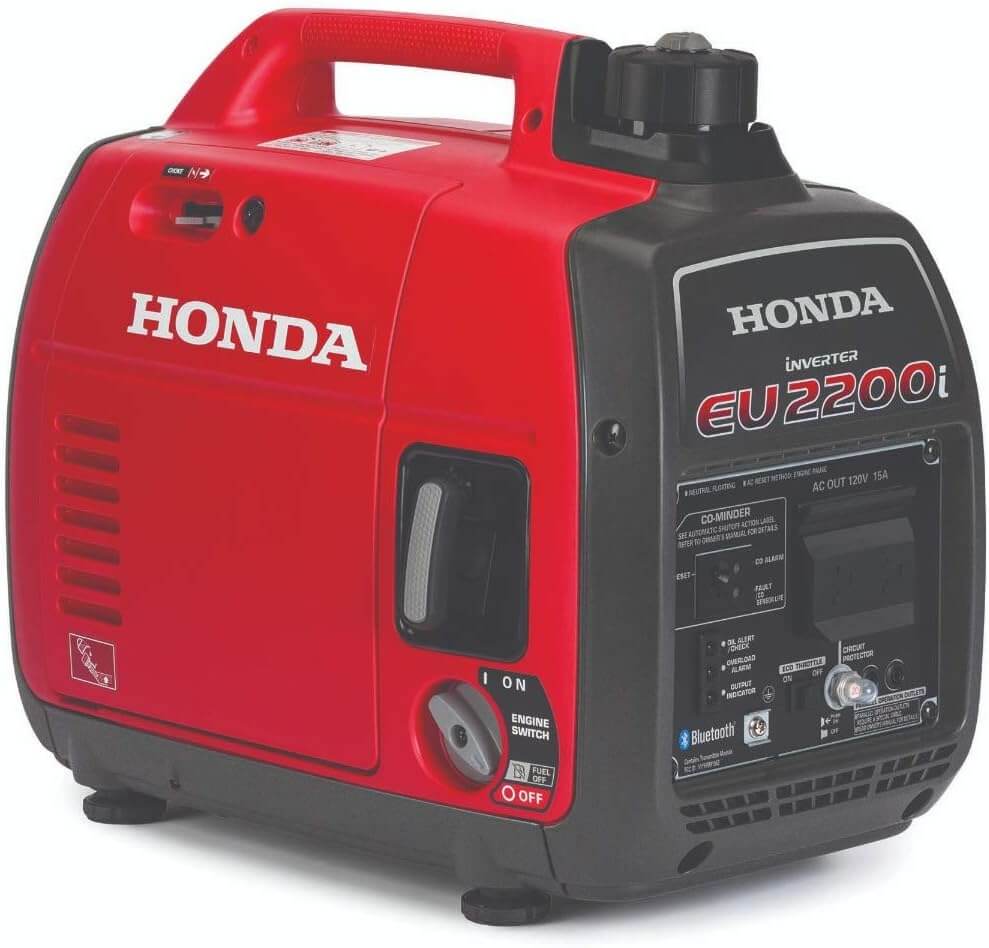
The Honda EU2200iTAG is a premium portable inverter generator renowned for its quiet operation, reliability, and fuel efficiency. It’s a popular choice for off-grid enthusiasts, campers, and anyone seeking a reliable backup power source during emergencies. This review dives into the EU2200iTAG’s features, performance, and potential drawbacks to help you decide if it’s the right investment for your needs.
Powerhouse in a Compact Package:
- Wattage: With a 2200-watt peak output and 1800 watts running, the EU2200iTAG offers enough power to run essential appliances like refrigerators, TVs, and even some power tools. It can also be paralleled with another EU2200iTAG for increased wattage needs.
- Fuel Efficiency: This Honda generator is known for being exceptionally fuel-thrifty. At 25% load, the 1-gallon fuel tank provides up to 8.1 hours of runtime, minimizing fuel consumption and refueling needs.
Quiet Operation and Eco-Throttle Technology:
- Noise Level: One of the EU2200iTAG’s biggest strengths is its whisper-quiet operation. At a quarter load, it produces around 53 decibels, making it suitable for use in campgrounds or even backyards with noise restrictions. Honda’s Eco-Throttle technology further reduces noise by automatically adjusting engine speed based on power requirements.
- User-Friendly Features: The EU2200iTAG boasts electric start for effortless operation and a user-friendly control panel with LED indicators for fuel level, overload, and oil level.
Safety and Advanced Features:
- Safety Features: Like most Honda generators, the EU2200iTAG prioritizes safety with features like CO-Minder technology that automatically shuts down the engine if carbon monoxide levels become dangerous. It also includes overload protection and automatic low-oil shutoff for added peace of mind.
- Advanced Features: The EU2200iTAG boasts a built-in Twin Air Filtration System for improved engine performance and lifespan. It also comes equipped with an ECO throttle for optimized fuel efficiency and quieter operation.
Customer Reviews:
Customer reviews for the Honda EU2200iTAG are overwhelmingly positive. Users praise its quiet operation, fuel efficiency, reliability, and user-friendly features. However, the most common criticism points towards the higher price tag compared to some competitor models.
Overall Recommendation:
The Honda EU2200iTAG is a top-of-the-line portable inverter generator. It delivers exceptional performance in terms of quiet operation, fuel efficiency, and reliability. The inclusion of safety features like CO-Minder and user-friendly functionalities make it a compelling choice. However, the premium price tag might be a significant consideration for budget-conscious buyers.
Here are some additional factors to consider before purchasing:
- Budget: The Honda EU2200iTAG is priced higher than many comparable inverter generators. Consider your budget and whether the premium features justify the cost.
- Wattage Needs: Carefully assess your power requirements to ensure the EU2200iTAG can handle your essential appliances.
- Portability: While relatively lightweight at 46 pounds, some users might find even lighter inverter generators more portable for specific needs.
Generac 8250 GP2500i 2,500-Watt Portable Inverter Generator
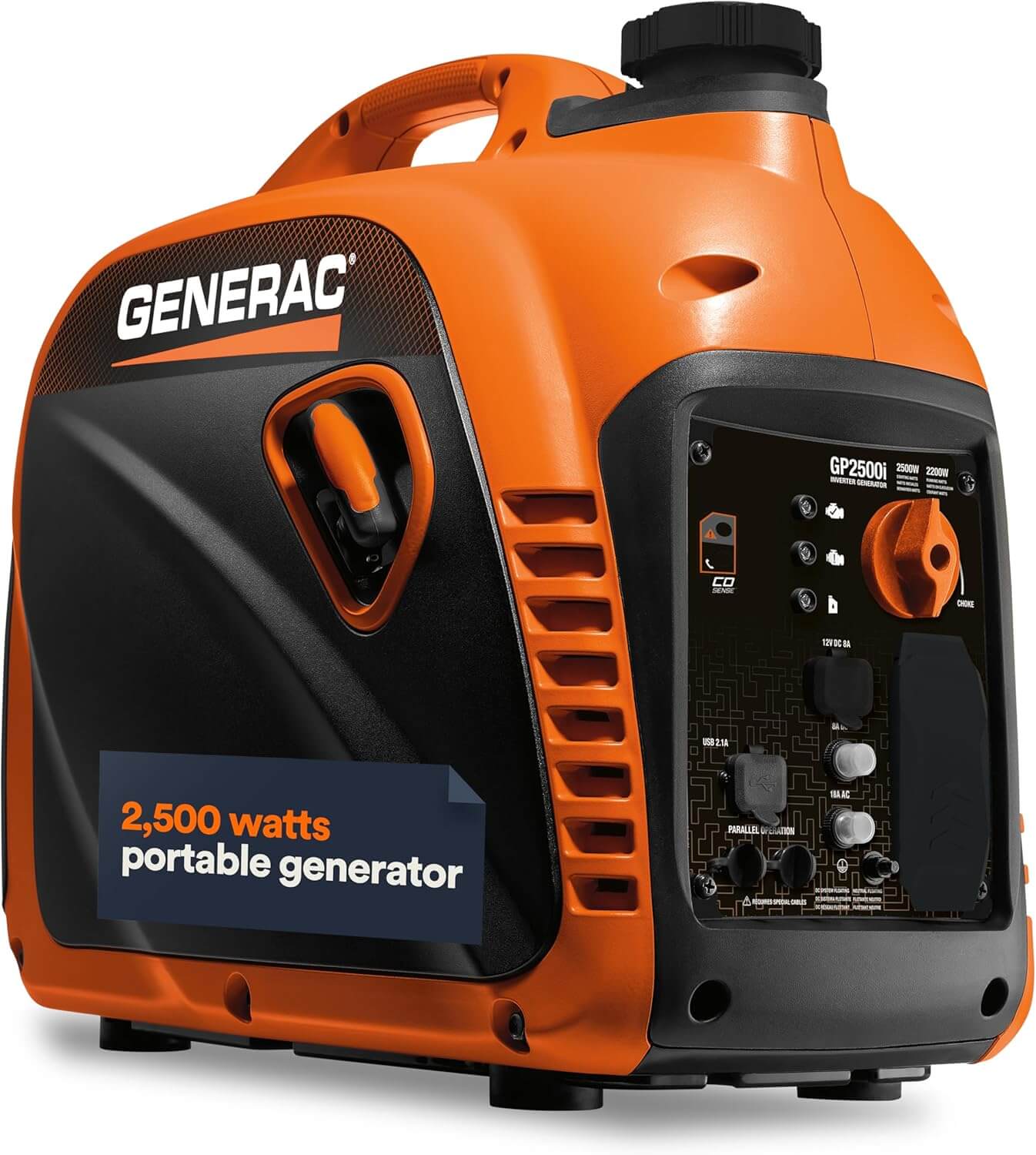
The Generac GP2200i is a portable inverter generator offering a budget-friendly option for powering essential appliances during emergencies or for recreational use like camping. It boasts a user-friendly design and relatively quiet operation. This review explores the GP2200i’s strengths and weaknesses to help you decide if it’s the right fit for your needs.
Power on a Budget:
- Wattage: With a rated output of 2200 watts (peak) and 1700 watts (running), the GP2200i can handle powering some essential appliances like a small refrigerator, lights, or a laptop. However, users with higher wattage needs (think power tools or air conditioners) might find this generator insufficient.
- Fuel Efficiency: The GP2200i gets decent marks for fuel efficiency. At 25% load, the 1.2-gallon fuel tank can provide up to 7.25 hours of runtime, meaning less frequent refueling compared to some smaller generators.
Portability and User-Friendliness:
- Weight and Size: At only 46.6 pounds, the GP2200i is a lightweight and compact inverter generator, making it easy to transport and store. Its closed design and molded carrying handle enhance portability.
- Ease of Use: The GP2200i features a straightforward control panel with easy-to-use buttons and LED indicators for fuel level and overload. It also includes electric start for effortless operation.
Customer Reviews:
Customer reviews for the Generac GP2200i are mixed. Many users appreciate its affordability, portability, and quiet operation. However, some reviewers have mentioned occasional issues with maintaining consistent power output and noise levels exceeding expectations. There are also comments regarding the lack of a drain plug for oil changes, making maintenance slightly messier.
Overall Recommendation:
The Generac GP2200i is a solid option for budget-conscious buyers seeking a portable inverter generator for light use. Its compact size, user-friendly design, and electric start make it convenient for camping trips or emergency backup power for smaller appliances. However, be mindful of its limitations in terms of wattage output and potential noise levels.
Here are some additional factors to consider before purchasing:
- Wattage Needs: Carefully assess your power requirements to ensure the GP2200i can handle your essential appliances. Don’t overload the generator to avoid damage.
- Noise Expectations: While quieter than traditional generators, the GP2200i might not be ideal for noise-sensitive environments. Research noise level specifications to manage expectations.
- Maintenance: The lack of a dedicated oil drain plug can make oil changes slightly messier. Consider the ease of maintenance compared to other options.
Yamaha EF2200IS 2000-Watt Portable Inverter Generator
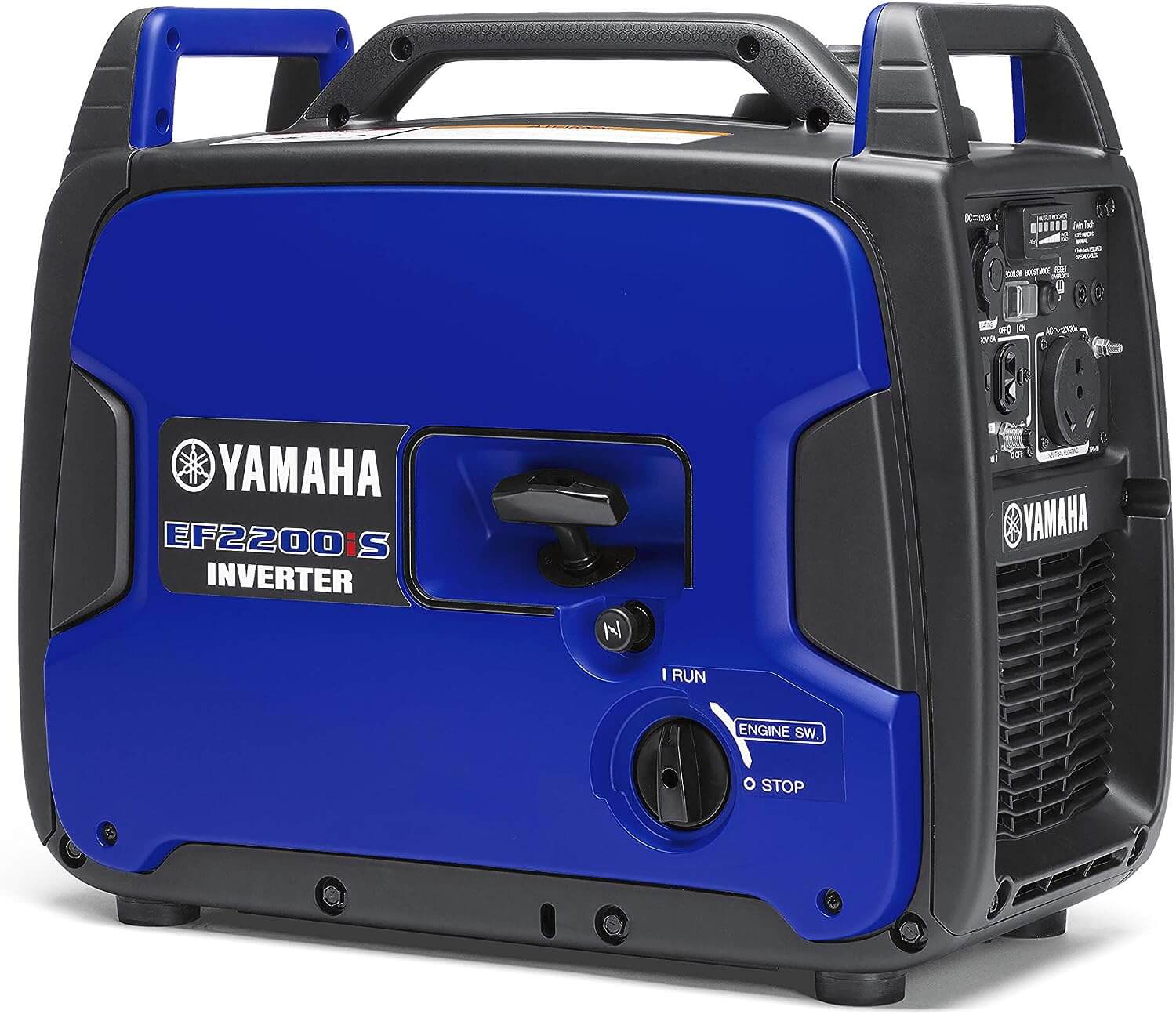
The Yamaha EF2200iS is a popular portable inverter generator known for its reliability, quiet operation, and user-friendly features. It’s a versatile choice for powering essential appliances during outages, camping trips, or other off-grid applications. This review dives into the EF2200iS’s strengths, weaknesses, and competitors to help you decide if it’s the right fit for your needs.
Power and Performance:
- Wattage: With a 2200-watt peak output and 1800 watts running, the EF2200iS offers enough power to run essential appliances like refrigerators, TVs, and some power tools. It can also be paralleled with another EF2200iS for increased wattage needs for powering larger appliances or multiple devices simultaneously.
- Fuel Efficiency: The Yamaha is known for being fuel-efficient. At 25% load, its 1.1-gallon fuel tank provides up to 10.5 hours of runtime, minimizing refueling needs during extended use.
Quiet Operation and User Convenience:
- Noise Level: One of the EF2200iS’s biggest strengths is its quiet operation. At a quarter load, it produces around 51 decibels, making it suitable for use in campgrounds, residential areas with noise restrictions, or even backyards without disturbing neighbors.
- User-Friendly Features: The EF2200iS boasts user-friendly features like a simple control panel with LED indicators, a three-way valve for easy fuel shutoff, and a tool-less oil change process for convenient maintenance. The tri-handle design facilitates easy carrying and maneuverability for its weight class.
Safety and Durability:
- Safety Features: Like most quality inverter generators, the EF2200iS prioritizes safety with features like automatic shutdown for low oil or overload protection. It also includes a DC outlet for 12V battery charging.
- Durability: Yamaha is known for its reliable engines, and the EF2200iS is no exception. Customer reviews often praise its build quality and longevity.
Customer Reviews:
Customer reviews for the Yamaha EF2200iS are generally positive. Users appreciate its quiet operation, fuel efficiency, user-friendly features, and reliable performance. However, some reviewers have mentioned a slightly higher price tag compared to some competitors.
Overall Recommendation:
The Yamaha EF2200iS is a strong contender in the portable inverter generator market. It delivers excellent performance with quiet operation, fuel efficiency, and user-friendly features. The inclusion of safety features and a reputation for durability make it a compelling choice for various applications. However, the price point might be a consideration for budget-conscious buyers.
Here are some additional factors to consider before purchasing:
- Budget: The Yamaha EF2200iS falls on the higher end of the price spectrum compared to some competitor models with similar wattage output.
- Wattage Needs: Carefully assess your power requirements to ensure the EF2200iS can handle your essential appliances.
- Weight and Size: While relatively portable for its class, some users might find even lighter inverter generators more suitable for specific needs.
By carefully considering these factors and your specific needs, you can determine if the Yamaha EF2200iS is the right investment to power your off-grid adventures or provide reliable backup power during emergencies.
Additional Considerations:
- A common point of comparison for the Yamaha EF2200iS is the Honda EU2200i. Both generators offer similar features and performance, with the Honda often holding a slight edge in noise reduction. The deciding factor might come down to budget and personal preference for each brand.
A-iPower Portable Inverter Generator, 2000W
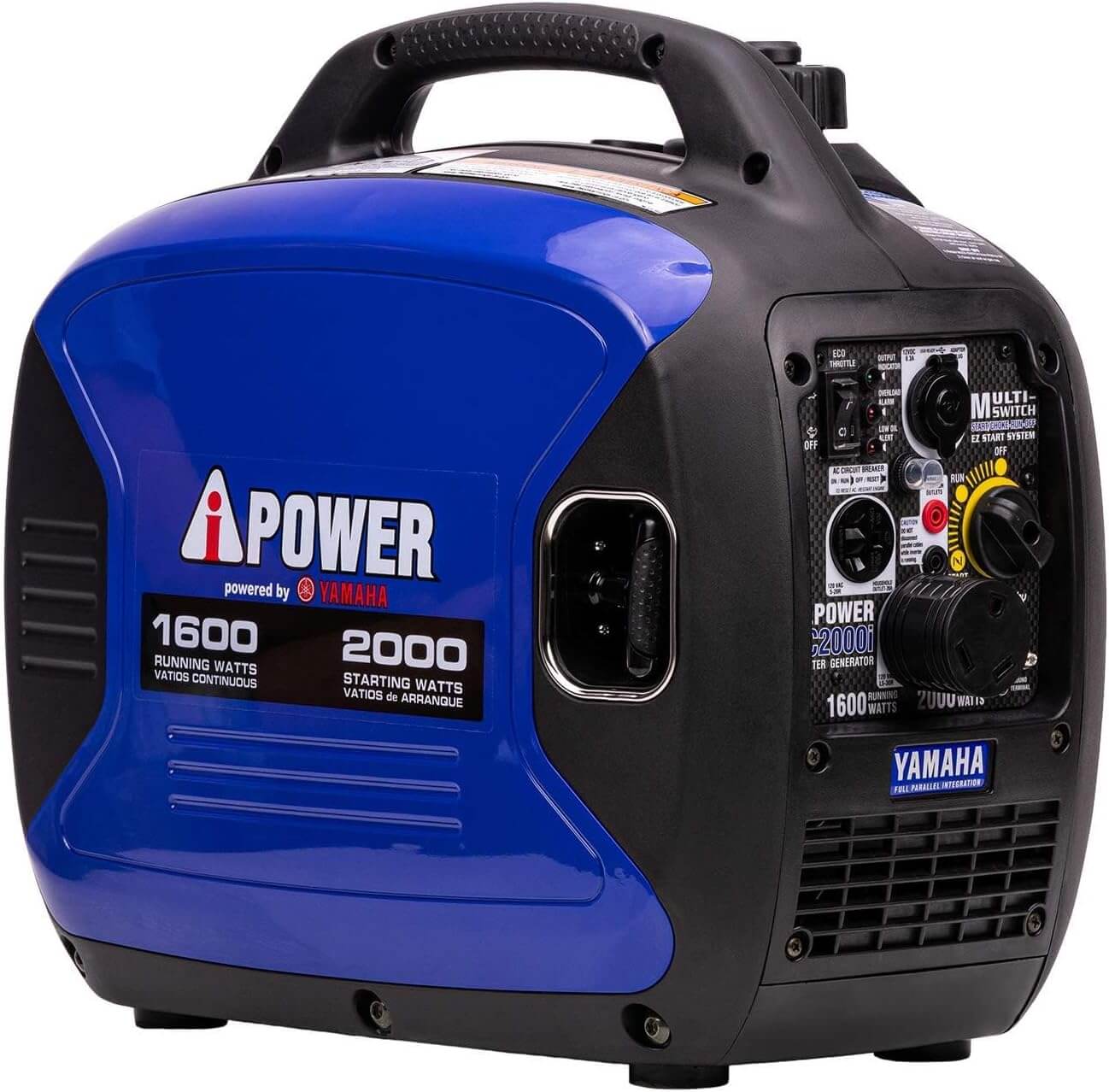
The A-iPower SUA2200i is a portable inverter generator that offers a budget-conscious alternative for powering essential appliances during emergencies or for recreational use like camping. It boasts a user-friendly design and comes equipped with a Yamaha engine, known for reliability. This review explores the SUA2200i’s strengths and weaknesses to help you decide if it’s the right fit for your needs.
Power on a Budget:
- Wattage: With a rated output of 2200 watts (peak) and 1800 watts (running), the SUA2200i can handle powering some essential appliances like a small refrigerator, lights, or a laptop. However, similar to other inverter generators in this wattage range, it might be insufficient for power tools or air conditioners.
- Fuel Efficiency: The A-iPower gets decent marks for fuel efficiency. At 25% load, the 1.2-gallon fuel tank can provide up to 10 hours of runtime, meaning less frequent refueling compared to some smaller generators.
Portability and User-Friendliness:
- Weight and Size: At 47 pounds, the SUA2200i is a relatively lightweight and compact inverter generator, making it reasonably easy to transport and store.
- Ease of Use: The SUA2200i features a straightforward control panel with easy-to-use buttons and LED indicators for fuel level and overload. It also includes electric start for effortless operation.
Customer Reviews:
Customer reviews for the A-iPower SUA2200i are mixed. Many users appreciate its affordability, portability, and user-friendly design. However, some reviewers have mentioned occasional issues with maintaining consistent power output and noise levels exceeding expectations. There are also comments regarding a lack of features like a fuel gauge or an ECO mode for optimized fuel efficiency found in some competitor models.
Overall Recommendation:
The A-iPower SUA2200i can be a suitable option for budget-minded buyers seeking a portable inverter generator for light use. The Yamaha engine provides a reputation for reliability, and the electric start is a convenient feature. However, be mindful of potential limitations in power output, noise level, and absence of some advanced features.
Here are some additional factors to consider before purchasing:
- Wattage Needs: Carefully assess your power requirements to ensure the SUA2200i can handle your essential appliances. Don’t overload the generator to avoid damage.
- Noise Expectations: While quieter than traditional generators, the SUA2200i might not be ideal for noise-sensitive environments. Research noise level specifications to manage expectations.
- Missing Features: Some competitor models offer features like a fuel gauge or ECO mode for optimized fuel efficiency, which are absent in the SUA2200i. Consider if these are important functionalities for you.
By carefully considering these factors and your specific needs, you can determine if the A-iPower SUA2200i is the right portable inverter generator for your next adventure or emergency backup power needs.
Additional Considerations:
- A common competitor in this wattage range is the Westinghouse iGen2200. The Westinghouse model might be slightly quieter and offer a few more features, but typically comes at a slightly higher price point.
Additional Considerations for Off-Grid Power
While portable inverter generators offer a convenient and reliable source of off-grid power, it’s important to consider your long-term needs and budget. Here are some additional factors to explore:
- Alternative Off-Grid Power Solutions: For a more sustainable approach, consider renewable energy sources like solar generators or wind turbines. Solar generators utilize solar panels to convert sunlight into electricity, while wind turbines harness wind energy for power generation. These options require an initial investment but can offer significant cost savings and environmental benefits in the long run.
- Professional Installation and Safety: Regardless of your chosen power source, safety is paramount. When dealing with electrical systems, it’s crucial to consult with a qualified electrician for proper generator installation and implementation of safety measures like transfer switches to prevent accidentally feeding power back into the utility grid.
- Exploring All Options: The best off-grid power solution depends on your specific needs, location, and budget. Research different options, including solar, wind, and generator-based systems, to find the one that best suits your requirements.
By carefully considering these factors and consulting with a qualified electrician, you can ensure you have a safe and reliable off-grid power solution that meets your needs.
Conclusion
In the battle for backup power, five inverter generators rev their engines for your attention. Let’s break through the noise and see which one fits your off-grid needs best.
Thrifty campers seeking a lightweight champion might look to the Westinghouse WGen2200. It’s friendly on the wallet and whispers compared to its roaring gasoline generator cousins, but its punch might be lighter for powering heavy-duty appliances.
Honda’s EU2200i is the undisputed luxury king. It’s the quietest of the bunch, sips fuel like a miser, and boasts legendary Honda reliability. But all that class comes at a premium price.
Generac’s GP2200i throws its budget-friendly hat in the ring. It’s compact and easy to move around, making it perfect for quick camping trips. However, its wattage limitations might leave some appliances yearning for more juice.
Yamaha’s EF2200iS is a well-rounded contender. It strikes a sweet spot between quiet operation, fuel efficiency, and user-friendly features. Plus, the Yamaha engine is known for its durability. It might cost a little more than some, but champions a reliable off-grid experience.
A-iPower’s SUA2200i is another budget-minded option, packing a Yamaha engine for peace of mind. While it starts easy and offers decent runtime, keep in mind that it might not be the quietest and some features found in competitors are missing.
So, which generator conquers your needs? Consider your budget, the wattage your appliances crave, and how much peace and quiet you require. No matter your choice, one thing’s for sure – with the right generator by your side, even a power outage can’t keep you from enjoying your off-grid adventure!
